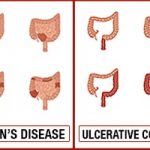 The human digestive system is an important part of the body. It breaks down the food we eat, absorbs nutrients, and is even home to many helpful bacteria. There are many conditions where the digestive system has become compromised in some way, limiting its function. One such condition is called Crohn’s disease, an inflammatory bowel disease that can lead to many discomforting symptoms.
The human digestive system is an important part of the body. It breaks down the food we eat, absorbs nutrients, and is even home to many helpful bacteria. There are many conditions where the digestive system has become compromised in some way, limiting its function. One such condition is called Crohn’s disease, an inflammatory bowel disease that can lead to many discomforting symptoms.
We at Bel Marra feel that this condition should be given more exposure, so we have rounded up articles about Crohn’s disease and how it relates to mild cognitive impairment, diverticulitis, arthritis, and another form of inflammatory bowel disease called ulcerative colitis.
Crohn’s disease patients show signs of mild cognitive impairment: Study
Advertisement
Crohn’s disease patients show signs of mild cognitive impairment. Cognitive responsiveness was found to be 10 percent slower in Crohn’s disease patients, and this impairment was associated with symptom severity and active inflammation.
The results go hand in hand with the claims by many patients who report memory lapses and difficulty concentrating. The study also revealed that Crohn’s patients have greater depression scores and poorer sleep quality ratings. Continue reading…
 Crohn’s disease vs. diverticulitis: Causes, symptoms, risk factors, and complications
Crohn’s disease vs. diverticulitis: Causes, symptoms, risk factors, and complications
Crohn’s disease and diverticulitis are conditions that affect the gastrointestinal system, and although they may present themselves similarly, they are two unique conditions.
It is part of the group of conditions known as inflammatory bowel diseases (IBDs). Prior to the 20th century, before the rise of hygiene and urbanization, inflammatory bowel disease was quite rare. Currently, IBD is found in developed countries and is believed to be caused by a lack of germ resistance development – although the exact cause is still unknown.
For those living with IBDs, their immune system mistakes food and bacteria in the gastrointestinal tract for an allergen or foreign substance, so it sends out cells to destroy it. The result of these attacks is chronic inflammation. Continue reading…
 New research links Crohn’s disease to arthritis
New research links Crohn’s disease to arthritis
New research published in Science Translational Medicine has revealed a bacterial link between Crohn’s disease and arthritis. Crohn’s is a form of inflammatory bowel disease, or IBD, that causes abdominal pain and diarrhea, and patients have also reported experiencing joint pain.
The immune system of patients with Crohn’s attacks the bowels and digestive system, but it can also target the musculoskeletal system and cause spondyloarthritis, resulting in spine and joint pain. This new research has found a link between the two conditions that may help explain why the immune system can turn its sights on the musculoskeletal system. Continue reading…
 Crohn’s disease vs. ulcerative colitis, differences in symptoms, causes, and treatment
Crohn’s disease vs. ulcerative colitis, differences in symptoms, causes, and treatment
Crohn’s disease and ulcerative colitis are part of a group of conditions known as inflammatory bowel diseases (IBD). Prior to the 20th century, before the rise of hygiene and urbanization, inflammatory bowel disease was quite rare. Currently, IBD is found in developed countries. It is believed to be caused by a lack of germ resistance development—although the exact cause is still unknown.
For those living with IBDs, their immune system mistakes food and bacteria in the gastrointestinal tract for an allergen or foreign substance, so it sends out cells to destroy it. The result of these attacks is chronic inflammation.
Advertisement
Although the exact causes of Crohn’s disease and ulcerative colitis are unknown, genetics and environmental factors are believed to play a role. Crohn’s disease and ulcerative colitis are often interchanged for one another, but we will outline the differences between the two, including symptoms, causes, and treatments to provide you with a better understanding of either condition. Continue reading…
 Chronic inflammation in Crohn’s disease associated with abdominal tumors (peritoneal mesothelioma): Study
Chronic inflammation in Crohn’s disease associated with abdominal tumors (peritoneal mesothelioma): Study
Chronic inflammation in Crohn’s disease is associated with abdominal tumors (peritoneal mesothelioma). The researchers examined data from nearly 3,800 participants with malignant mesothelioma (MM), of which 500 had peritoneal mesothelioma (PM), to look for a possible link with Crohn’s disease. Three of the patients were found to have Crohn’s disease, but only one of them had had any known exposure to asbestos, a known cause of MM.
The study then revealed that having Crohn’s disease may increase the risk of developing malignant mesothelioma. The results are significant, because even though MM is quite rare, the numbers of Crohn’s disease patients grow, meaning, the number of MM cases may grow as well. Continue reading…
